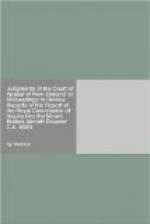The Erebus Commission was appointed to inquire into the causes and circumstances of the crash. Among the particular questions referred to it was:
(g) Whether the crash of the aircraft or the death of the passengers and crew was caused or contributed to by any person (whether or not that person was on board the aircraft) by an act or omission in respect of any function in relation to the operation, maintenance, servicing, flying, navigation, manoeuvring, or air traffic control of the aircraft, being a function which that person had a duty to perform or which good aviation practice required that person to perform?
All the terms of reference fall well within s. 2 (e). The Commission was not appointed to inquire into allegations of crime so we are not now called upon to go into the question whether a Royal Commission can be appointed for such a purpose, on which New Zealand and Australian authorities diverge (see In re The Royal Commission on Licensing (1945) N.Z.L.R. 665, 679; and D.R. Mummery “Due Process and Inquisitions”, 97 L.Q.R. 287). Nevertheless paragraph 377 of the Royal Commission Report contains findings of organized perjury. The judgment in the leading New Zealand case, Cock v. Attorney-General, while denying that the prerogative can authorize a Commission with the main object of inquiring into alleged crimes, recognizes at p. 425 that a Commissioner may investigate an alleged crime if to do so would be “merely incidental to a legitimate inquiry and necessary for the purpose of that inquiry”. We think that the test must be what is reasonably incidental to valid terms of reference. In relation to paragraph 377 the allegation of excess of jurisdiction turns accordingly on whether the findings are reasonably incidental to an inquiry into the causes and circumstances of the crash.
It is difficult to find reasons why the Court should refuse to entertain that question. While Commissions of mere inquiry and report are largely free from judicial control, there is strong authority indicating that the Courts have at least a duty to see that they keep within their terms of reference. We agree with the opinion of Myers C.J. in the Royal Commission on Licensing case at p. 680 that it is implicit in all the judgments in the Privy Council and the High Court in Attorney-General for the Commonwealth of Australia v. Colonial Sugar Refining Co. Ltd (1914) A.C. 237, 15 C.L.R. 182, that if it can be said in advance that proposed questions are clearly outside the scope of the inquiry they are irrelevant and cannot be permitted. In the Royal Commission on Licensing case that very principle was applied in this Court, it being held that certain matters were not within the ambit of the Commission’s inquiry. That decision was given on a case stated by the Royal Commission under ss. 10 and 13 of the 1908 Act, but the Sugar Company case was an action for declaration and injunctions and the procedure




